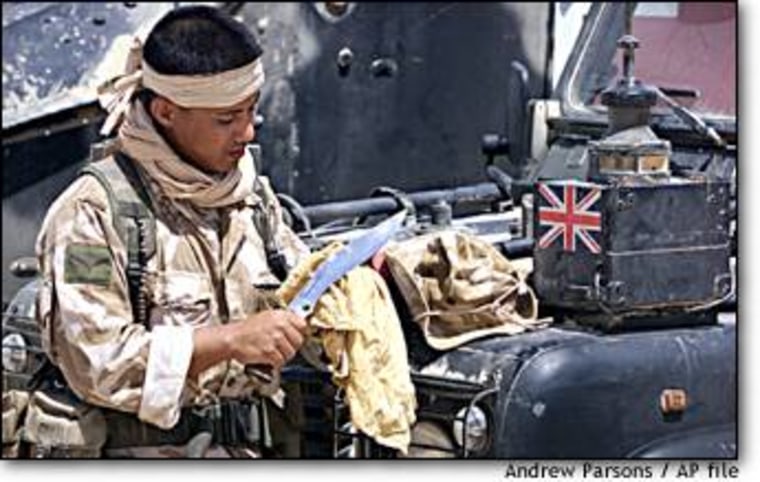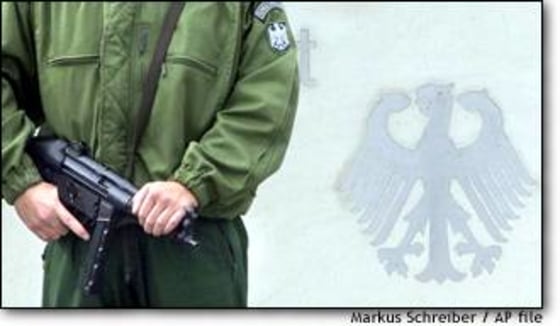The Sept. 11 attacks on the United States brought unmistakable changes to Europe’s prosperous democracies. Armed soldiers reappeared in force on German, French and Spanish streets for the first time since the 1980s. NATO pledged to regard the attacks as an act of war against all its members — 17 of them in Europe. There have been moments of silence, canceled weddings, calls to curtail civil liberties and issue national identity cards. Europe’s Muslims, far more numerous than their American counterparts, have been assaulted and denounced. But outside Tony Blair’s Britain, Europe is hardly at war.
AS THE UNITED States and Britain have stitched together a broad and fragile alliance for a military campaign that will target the alleged perpetrators — extremist leader Osama bin Laden and his protectors in Afghanistan’s Taliban regime — the rest of Europe has been wondering what it all means for them. There have been none of the anticipated mass peace rallies and assaults on McDonald’s restaurants that many U.S. diplomats here expected, although the left-wing press in Europe has hinted at a certain satisfaction in seeing the superpower taken down a notch.
“It’s really been a refreshing change,” said a U.S. diplomat in London, “and I see behind that two things: the genuine horror people have for what has happened, and relief that we didn’t hit back wildly with nuclear weapons or something equally unfocused.”
UNCLE SAM WANTS WHO?
Beyond Britain, however, none of the other 16 NATO military powers appears to have a significant role in what is coming, at least not in the first phase of what President Bush has dubbed “the war on terrorism.” The British prime minister delivered a call to arms in his parliament this week and an aircraft carrier task force in the Arabian Sea and the world’s best regarded special forces troops and commandos are already probing their targets.

On Saturday, France went so far as to ask publicly to be included, offering to join in the attacks as long as French commanders can take part in the planning and selection of targets. French naval forces in the Indian Ocean, its bases at Djibouti and Mayotte Island, and its well regarded foreign legion, could be very useful.
Europe’s other powers won’t feel the snub as keenly, and they are playing a supporting role. From Spain to Turkey, Italy to Norway, alliance militaries are playing a supporting role by making air bases, supplies and communications facilities available.
And their police and intelligence agencies have made dozens of arrests, followed thousands of leads and poured their full energy into determining the extent of al-Qaida’s operations on their soil.
Yet unlike Kosovo or the gulf, where even the Greeks and the Danes sent a frigate or two, the “ask” from Washington is underwhelming many here. Only one of the eight requests the U.S. made of its alliance Thursday involved military action of any kind, and then only in the Eastern Mediterranean — some 1,500 miles from Afghanistan.
In Britain, the weekly magazine The Economist said, “As it recruits new friends and gees up old ones, everywhere from Tunisia to Tajikistan, the United States has shown little interest in making use of NATO, either for its decision-taking capacity or for its military structure.”
The Times of London put it more sharply, noting that Russia this week offered intelligence and logistical support, including President Vladimir Putin’s quiet role in winning access for U.S. forces at former Soviet military bases in Uzbekistan and Tajikistan.
“By offering such generous help to America and moving much closer to NATO, the Russian president has proved to be a more useful ally to Washington than many of its long-established NATO allies,” Times Moscow correspondent Vanora Bennet said.
LOCATION, LOCATION, LOCATION
To be fair, NATO is not constituted to fight wars like this one, located 1,000 miles from the eastern border of Turkey, the nearest member state. Despite NATO’s participation in Kosovo, the alliance traditionally took a very conservative stance when asked to join conflicts that originated with only one member. NATO refused to support France in its war against Algeria’s independence in the early 1960s, for instance, and turned down requests to aid the United States in Vietnam or Britain’s 1982 Falklands campaign.
NATO’s decision to invoke “Clause 5” of its charter — declaring, in essence, that America’s war was NATO’s war — is, therefore, notable. But even if the rest of NATO were eager to contribute military forces, none of them apart from France offers a particular skill in demand right now. Still, U.S. planners apparently believe that broadening the coalition militarily, at this stage at least, would be as much of a hindrance as a help.
The main request from the United States to NATO right now appears to focus on getting European militaries to handle their own defense. This goes not only for defense against the kinds of attacks that devastated New York and Washington, but also for peacekeeping operations in the Balkans, which tied down U.S. forces now earmarked for other missions.
Last week, in a milestone that went unnoticed amid all the talk of war, Germany stepped forward and agreed to lead the 1,000-strong peacekeeping force meant to keep Macedonia’s Slavs and Muslims from killing each other. Other NATO militaries have agreed to replace American forces in Bosnia and Kosovo as they rotate into southwest Asia or other places.
NATO Secretary-General George Robertson put the best spin on it Thursday, saying that the alliance’s job was to “make sure that the right facilities and the right capabilities can be deployed in the right way and at the right time. Today’s decision clearly demonstrates the allies’ resolve to combat terrorism.”
MSNBC’s Michael Moran is on assignment in London.
